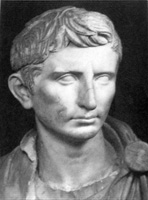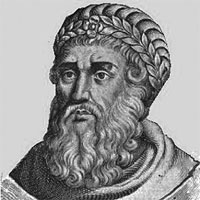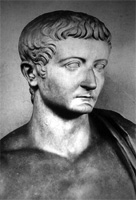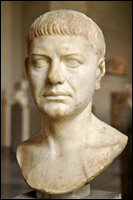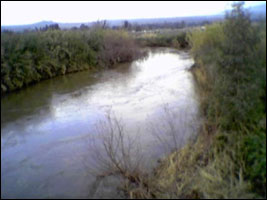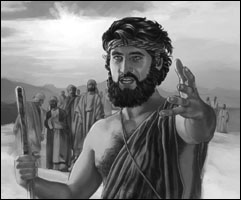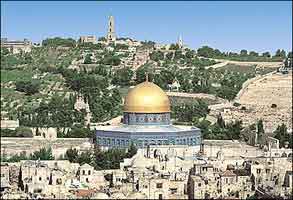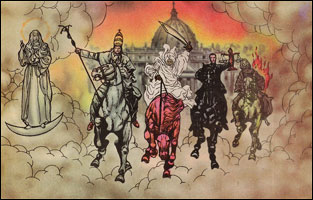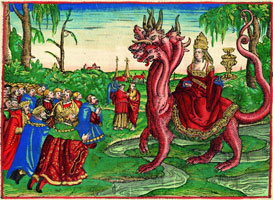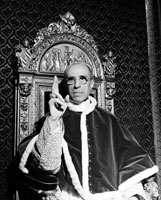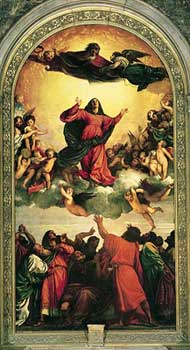JOHN THE BAPTIST WAS NOT ELIJAH THE PROPHET REINCARNATED BECAUSE REINCARNATION IS
A LIE OF THE DEVIL! ELIJAH NEVER DIED BUT WAS TAKEN UP TO HEAVEN ALIVE (II KINGS 2:11). JOHN THE BAPTIST, AS THE FORERUNNER OF THE MESSIAH, CAME IN THE SPIRIT AND POWER OF ELIJAH. |
The Edomites reincarnated the fake state of "Israel," and now they are waiting for the literal Elijah to be reincarnated in Old Jerusalem!
Not one single person born since Adam and Eva ever returned to earth in a different body. The Messiah and Saint Paul came back from the dead in the very same bodies that they occupied during their lifetimes! Edomite reincarnation is nothing more than the old Babylonian paganism of Nimrod, Queen Semiramis, and their "reincarnated" son Tammuz (Genesis 10:8, Ezekiel 8:14).
When presenting TRUTH, the Holy Bible uses dreams, visions, allegories, symbols, parables, and similitudes:
I have also spoken by the prophets, and I have multiplied visions, and used similitudes, by the ministry of the prophets (Hosea 12:10).
In II Samuel Chapter 23, 3 mighty men in David's army broke through the ranks of the Philistines in Bethlehem in order to get a drink of water for their thirsty leader:
And (David) said, "be it far from me, O JEHOVAH, that I should do this: is not this the blood of the men that went in jeopardy of their lives?" therefore he would not drink it. These things did these three mighty men (II Samuel 23:17).
In that similitude, WATER is called BLOOD, but they are not the same, and Jews were also forbidden to drink literal blood.
In Psalm 89:20, the Messiah is called DAVID . . . but he is not David reincarnated . . . but the divine son of David.
Daniel the Prophet told King Nebuchadnezzar that he was the HEAD OF GOLD (Daniel 2:38). Before his conversion, King Nebuchadnezzar had a hard and stubborn head, but it was not made of gold!
The "Oy Veys" and the "Aves" make a fatal error when they give a carnal, literal interpretation to Scriptures that are manifestly spiritual or symbolic. The greatest Biblical simile or allegory ever written was Pilgrim's Progress by Saint John Bunyan.
The very last communication that Israel received from JEHOVAH was a promise to send them Elijah the Prophet:
Behold I will send you Elijah the Prophet before the coming of the great and dreadful day of JEHOVAH: And he shall turn the hearts of the fathers to the children, and the hearts of the children to the fathers, lest I come and smite the earth with a curse (Malachi 4:5-6).
That prophecy was literally fulfilled when Elijah appeared with Joshua and Moses on the Mount of Transfiguration:
Now it came to pass, about eight days after these sayings, that he took Peter, James, and John, and went up on a mountain to pray. As he prayed, the appearance of his face was altered, and his robe became white and glistening. And behold, two men talked with him, who were Moses and Elijah, who appeared in glory and spoke of his Exodus which he was about to accomplish at Jerusalem (Saint Luke 9:28-31).
During the reigns of Augustus Caesar and Edomite King Herod, baby JOHANAN or John was born to the elderly Elizabeth—the wife of a Levitical priest named Zechariah.
John the Baptist was born at the Feast of Trumpets and the Messiah was born at Passover!
It was at the height of the Pax Romana, when all the world was at peace, that the angel Gabriel announced to Zechariah that his old and barren wife Elizabeth would give birth to a son:
Then an angel of JEHOVAH appeared to him, standing on the right side of the altar of incense. And when Zechariah saw him, he was troubled, and fear fell upon him. But the angel said to him, “Do not be afraid, Zechariah, for your prayer is heard; and your wife Elizabeth will bear you a son, and you shall call his name Johanan. And you will have joy and gladness, and many will rejoice at his birth. For he will be great in the sight of JEHOVAH, and shall drink neither wine nor strong drink. He will also be filled with the Holy Spirit, even from his mother’s womb. And he will turn many of the children of Israel to JEHOVAH Elohim. He will also go before him in the spirit and power of Elijah, to turn the hearts of the fathers to the children, and the disobedient to the wisdom of the just, to make ready a people prepared for JEHOVAH" (St. Luke 1:11-17).
Like Abraham and Sarah, the parents of the forerunner were old and well advanced in years.. It mirrors the miracle of Sarah conceiving in her old age.
|
|
|
In the English language, JOHANAN is transliterated as JOHN, Ioannes in Latin, Giovanni in Italian, Jean in French, and Juan in Spanish.
Just 6 months later, at the end of June, the same angel Gabriel appeared to Elizabeth's cousin Miriam, and told her that she was going to conceive a baby supernaturally—without a human father:
Now in the sixth month the angel Gabriel was sent by Elohim to a city of Galilee named Nazareth, to a virgin betrothed to a man whose name was Joseph, of the house of David. The virgin’s name was Miriam. And having come in, the angel said to her, “Rejoice, highly favored one, JEHOVAH is with you; blessed are you among women!” But when she saw him, she was troubled at his saying, and considered what manner of greeting this was. Then the angel said to her, “Do not be afraid, Miriam, for you have found favour with Elohim. And behold, you will conceive in your womb and bring forth a Son, and shall call His name Jehoshua" (St. Luke 1:26-31).
When Miriam doubted the angel's words, he told her that her aged cousin Elizabeth was already 6 months pregnant:
"And, behold, thy cousin Elizabeth hath also conceived a son in her old age, and this is the sixth month with her who was called barren. For nothing shall be impossible with Elohim" (St. Luke 1:36-37).
If the Messiah was born in December, the elderly Elizabeth would have given birth around the end of June—in the heat of the Judean summer....An absolute absurdity to expect an elderly woman to give birth at that time of the year.
Except for the horrible Slaughter of the Innocents by King Herod, peace prevailed in the world for the next 30 years due to the Pax Romana.
John the Baptist was like a trumpet blast to awaken Israel after 400 years of silence!
After the miraculous births of the forerunner and the Messiah, the next great event was the appearing of John the Baptist preaching in the wilderness of Judea. Roma had a new emperor named Tiberius, and Judea was formally annexed to the Empire when Pontius Pilate was appointed governor.
|
|
|
There was a 400-year period of silence until Israel heard the trumpet blast of John the Baptist preaching in the wilderness of Judea:
In those days came John the Baptist preaching in the wilderness of Judea, and saying, "repent for the kingdom of heaven is at hand." For this is he that was spoken of by the prophet Isaiah saying, "The voice of one crying in the wilderness, prepare ye the way of JEHOVAH, make his paths straight" (Matthew 3:1-3).
The Jordan River had a special significance for the people of Israel. Jordan means "descend" and it was a "stargate," or portal between heaven and earth. Joshua the son of Nun took command of the army by the River Jordan, and Elijah the Prophet ascended up to heaven by that same river.
|
|
|
All Judea went out to hear John the Baptist preach, even Roman soldiers:
And the soldiers likewise demanded of him, saying, "and what shall we do?" And he said unto them, "do violence to no man, neither accuse any falsely; and be content with your wages" (Saint Luke 3:14).
John the Baptist did not tell the soldiers to leave Israel and go back to Roma, or disband the Empire, because he knew that the Roman Empire was the legs of iron destined to trample down the whole earth until the end of time (Daniel Chapter 2).
|
|
|
Amazingly, John the Baptist—the forerunner of the Messiah—was mentioned by Josephus . . . but there is only one brief mention of the Messiah:
Now some of the Jews thought that the destruction of Herod's army came from God, and that very justly, as punishment for what he did against John, that was called the Baptist (Josephus, Antiquities, Book 18, Chapter 5).
After John was beheaded, many of the followers of the Messiah stopped following him. They believed a real Messiah would supernaturally open the prison doors and rescue John from the murderous King Herod.
|
Before the Resurrection of the Messiah, only Enoch, Moses, and Elijah the Prophet went directly to heaven. All the rest of the dead went down to Sheol, or Hades in Greek. Sheol was divided into 2 parts: Paradise or Abraham's Bosom, and Torments. Adam, Noah, Abraham, Samuel, King David, John the Baptist etc., etc., were in Paradise. The wicked King Herod—who tried to murder the baby Messiah—went to Torments.
The occupants of Torments were separated from Paradise by Tartarus or the fiery Bottomless Pit.
When the Messiah died, the huge veil of the Temple was torn in two from top to bottom, signifying that all the occupants of Paradise could now enter heaven:
Then, behold, the veil of the temple was torn in two from top to bottom; and the earth quaked, and the rocks were split, and the graves were opened; and many bodies of the saints who had fallen asleep were raised; and coming out of their graves after his resurrection, they went into the holy city and appeared to many (Matthew 27:51-53).
That did not include the occupants of Torments, because they are still there, waiting the resurrection of the damned on the Last Day.
Saint John the Beloved was the Messiah's chosen successor . . . not St. Peter!
Incredibly, the Messiah's most beloved disciple was also named Johanan or John. John stuck like GLUE to the Messiah for the entire 3.5-years of his ministry, and Satan was unable to sever the bond between the Teacher and his beloved disciple. John was the only male disciple to remain at Golgotha during the crucifixion:
Now there stood by the cross of Jehoshua his mother, and his mother’s sister, Miriam the wife of Cleophas, and Miriam Magdalene. When Jehoshua therefore saw his mother, and the disciple whom he loved standing by, he said to his mother, “Woman, behold your son! Then he said to the disciple, "Behold your mother!” And from that hour that disciple took her to his own home (St. John 19: 25-27).
From the moment the Messiah died, the physical bond with his mother was broken completely, so John now became her adopted son, and he took her into his home.
St. John later wrote the Gospel of John and 3 other short epistles. He was a pillar of the Congregation in Jerusalem for many years. Tradition says that he moved to Ephesus with Miriam after the destruction of the city by the Romans. Papal dogma claims that Miriam never died, but was assumed bodily into heaven (Feast of the Assumption). If anyone went straight to heaven without dying it was the Apostle John.
 Emperor Domitian (51 – 96 AD). Emperor from 81 to 96 AD. |
|
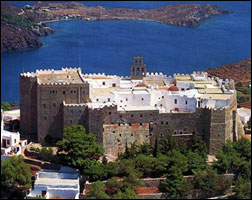 The Isle of Patmos in the Aegean Sea. |
It was during his imprisonment on the island that he had a series of 7 awesome visions recorded in the Apocalypse. Most of the symbols are taken from the books of Isaiah, Ezekiel, Daniel, Joel, and Zechariah.
 St. John (6 – 100 AD) recorded the visions that he saw on Patmos. |
|
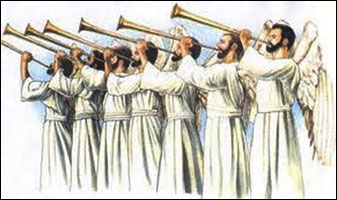 7 angels with 7 trumpets announced the future of Roma in advance. |
The visions of St. John are a continuation of the visions of Daniel the Prophet. Daniel saw the 3 previous empires of Babylon, Medo-Persia, and Greece, but St. John saw the future of the 4th Empire with the legs of iron.
|
St. John was astonished at the vision of a crowned woman riding the Beast because Roma hated kings, and the Romans prohibited women rulers.
St. John also saw a terrifying vision of Apollyon loosed from the Bottomless Pit (Apocalypse 9:11), and the inhabitants of the earth taking the 666 Mark of the Beast.
At the end of the amazing technicolor visions, St. John was taken to the New World, and he saw the New Jerusalem descending from heaven:
And he carried me away in the Spirit to a great and high mountain, and showed me the great city, the holy Jerusalem, descending out of heaven from Elohim having the glory of Elohim. Her light was like a most precious stone, like a jasper stone, clear as crystal. Also she had a great and high wall with twelve gates, and twelve angels at the gates, and names written on them, which are the names of the twelve tribes of the children of Israel: three gates on the east, three gates on the north, three gates on the south, and three gates on the west. Now the wall of the city had twelve foundations, and on them were the names of the twelve apostles of the Lamb (Apocalypse 21:10-14).
That great vision began to come to pass in 1520 when Saint Martin Luther wrote his magnum opus entitled: On the Babylonian Captivity of the Church.
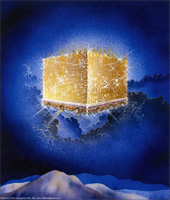 The New Jerusalem descending from heaven. |
|
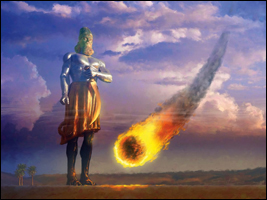 The STONE demolishing the feet and toes of iron and clay. |
St. John also saw a vision of Armageddon, or the last great battle between the followers of Christ and the followers of Satan:
And he (Satan) gathered them together into a place called in the Hebrew language Armageddon (Apocalypse 16:16).
That battle will not occur in the Old World—which is already controlled by the Vatican or Islam:
And he shall plant the tabernacles of his palace between the seas in the glorious holy mountain; yet he shall come to his end, and no one will help him (Daniel 11:45).
President Trump has postponed Armageddon . . . postponed . . . but not cancelled!!
Saint John was assumed into heaven . . . not the Virgin Miriam!
In 1950, Pope Pius XII infallibly declared that the Virgin Miriam was assumed bodily into heaven immediately after her death:
By the authority of our Lord Christ, of the Blessed Apostles Peter and Paul, and by our own authority, we pronounce, declare, and define it to be a divinely revealed dogma: that the Immaculate Mother of God, the ever Virgin Mary, having completed the course of her earthly life, was assumed body and soul into heavenly glory. (Pope Pius XII, Munificentissimus Deus, November 1, 1950).
When Pope Pius XII promulgated that dogma, Cardinal Spellman was military vicar of the U.S. armed forces. The U.S. was the only country in the world to possess atomic bombs . . . and the means to drop them on China or Russia!
|
Most of the history of early Christianity was destroyed by Emperor Jesus Constantine, but we can be certain that St. John ended his days in Ephesus, and was immediately resurrected and taken up to heaven .
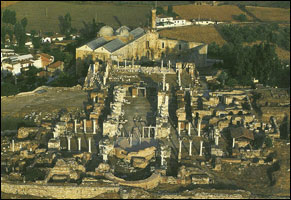 The ruins of the Basilica of St. John in Ephesus. |
|
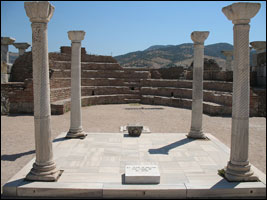 A plaque marks the spot where the tomb of St. John should have been. |
Here is a quote from a very prolific Roman Christian writer named St. Hippolyptus:
As it is a fatal error to give a carnal or mundane meaning to symbols and similes, so it is a fatal error to confuse St. Peter with the Apostle John . . . or with the mother of the Messiah.John, again, in Asia, was banished by Domitian the king to the isle of Patmos in which also he wrote his Gospel and saw the Apocalyptic visions; and in Trajan's time he fell asleep at Ephesus, where his remains were sought for, but could not be found. (Hippolyptus, Treatise on the Twelve Apostles, p. 130).
Vital links
References
Josephus, Flavius. The New Complete Works. Translated by William Whiston. Kregel Publicastion, Grand Rapids, Michigan, 1999.
Roberts, Rev. Alexander. Anti-Nicene Christian Library. Translations of the Writings of the Fathers. T. & T. Clark, Edinburgh, Scotland, 1869.
